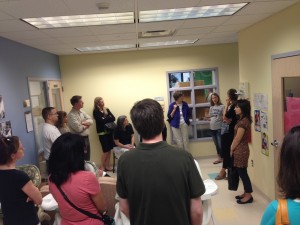Campus Compact’s criteria for quality higher-education service-learning syllabi are grounded in four “conceptual criteria”:
1. Engagement – Does the service component meet a public good? How do you know this? Has the community been consulted? How? How have campus- community boundaries been negotiated and how will they be crossed?
2. Reflection – Is there a mechanism that encourages students to link their service experience to course content and to reflect upon why the service is important?
3. Reciprocity – Is reciprocity evident in the service component? How? “Reciprocity suggests that every individual, organization, and entity involved in the service- learning functions as both a teacher and a learner. Participants are perceived as colleagues, not as servers and clients.” (Jacoby, 1996 p.36)
4. Public Dissemination – Is service work presented to the public or made an opportunity for the community to enter into a public dialogue? For example: Do oral histories that students collect return to the community in some public form? Is the data students collect on the saturation of toxins in the local river made public? How? To whose advantage?
Community-Based Learning Syllabi from Notre Dame Faculty
Ed Kelly, Community Writing and Rhetoric
Center for Social Concerns: Social Concerns Seminars Syllabi
Community-Based Projects Produced through Notre Dame Courses
Latino Community Research–Professor Marisel Moreno-Anderson
The Lios Mor Project–Professors Sean O’Brien and Connie Snyder Mick
- The Lios Mor Project–Blog created by students from Notre Dame, Lurgan Junior High, and Lismore Junior High in Northern Ireland, Spring 2012
- Article on The Lios Mor Project authored by Notre Dame student participant, Kathleen Toohill
- iBook Departmental Report on The Lios Mor Project
Community-Based Learning Syllabi Produced Outside Notre Dame
The Civic Engagement Syllabi Project from Imagining Americas

It was very insightful to hear from Ed Kelly about how his approach to CBL in his classes. His presentation highlighted for me how important it is to focus on “what matters” and to model it. After looking at Ed’s course materials, I feel reassured that it really can be done. Thanks, Ed.